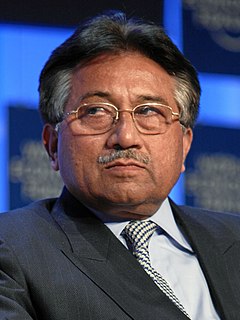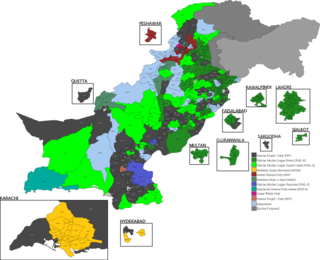
General Pervez MusharrafNI(M) HI(M) TBt is a Pakistani former politician and a retired four-star general of the Pakistan Army who became the tenth president of Pakistan after the successful military takeover of the federal government in 1999. He also served as the 10th Chairman Joint Chiefs of Staff Committee from 1998 to 2001 and the 7th Chief of Army Staff from 1998 to 2007. Musharraf held the presidency from 2001 until 2008, he fled the country and resigned to avoid impeachment. In 2007, he declared emergency and suspended the Constitution of Pakistan for which he was tried for high treason and sentenced to death, but he hasn't returned to the country after resigning.

Mian Muhammad Nawaz Sharif is a centre-right, conservative Pakistani businessman and convicted politician and absconder who has served as the Prime Minister of Pakistan for three non-consecutive terms. He is the longest-serving prime minister of Pakistan, having served a total of more than 9 years across three tenures. Each term has ended in his ousting.

The Pakistan Muslim League (Nawaz) is a centre-right and liberal conservative political party in Pakistan. Alongside the Pakistan Tehreek-e-Insaf (PTI) and Pakistan Peoples Party (PPP), it is one of the three major political parties of the country. The party was founded by former Prime Minister Nawaz Sharif after the dissolution of Islamic Democratic Alliance in 1993. The party's platform is generally conservative, which involves supporting free markets, deregulation, lower taxes and private ownership. Although the party historically supported social conservatism, in recent years, the party’s political ideology and platform has become more liberal on social and cultural issues.

The Pakistan Muslim League Urdu: پاکستان مسلم لیگ (ق); Pākistān Muslim Līg (Qāf), Acronyms: PML(Q), PML-Q, PMLQ, "Q League") is a centrist to centre-right-nationalist political party in Pakistan. As of the 2018 parliamentary election, it has a representation of 5 seats. It previously served as an ally of former Prime Minister Raja Pervez Ashraf's government, and led a joint election campaign in 2013 alongside Pakistan Peoples Party (PPP) in Punjab and Balochistan provinces against its rival Pakistan Muslim League (N), a fiscally conservative and centre-right force.

The prime minister of Pakistan is the constitutional head of government of the Islamic Republic of Pakistan, designated as the "Chief Executive of the Islamic Republic".
The Seventeenth Amendment to the Constitution of Pakistan was an amendment to the Constitution of Pakistan passed in December 2003, after over a year of political wrangling between supporters and opponents of Pakistani President Pervez Musharraf.
Amjad Farooqi, alias Amjad Hussain, was a Pakistani militant who operated in Indian-administered Kashmir, Afghanistan and Pakistan.

Chaudhry Shujaat Hussain (Punjabi: چوہدری شجاعت حسین; Urdu: چودھری شجاعت حسین; is a senior Pakistani politician from a Punjabi Jat family of Gujrat who previously served as 16th prime minister of Pakistan. Hussain is the party president of the Pakistan Muslim League from 2003 until 2022.

Nazim Hussain Siddiqui a Pakistani jurist who served as Chief Justice of the Supreme Court of Pakistan, from 31 December 2003 to 29 June 2005.

The Parliament of Pakistan is the federal and supreme legislative body of Pakistan. It is a bicameral federal legislature that consists of the Senate as the upper house and the National Assembly as the lower house. According to the constitution of the Islamic Republic of Pakistan, the President of Pakistan is also a component of the Parliament. The National Assembly is elected for a five-year term on the basis of adult franchise and one-man one-vote. The tenure of a Member of the National Assembly is for the duration of the house, or sooner, in case the Member dies or resigns. The tenure of the National Assembly also comes to an end if dissolved on the advice of the Prime Minister or by the president in his discretion under the Constitution.

The National Security Council is a federal institutional and consultative body chaired by the Prime Minister of Pakistan as its chairman. The NSC is a principal forum that is mandated for considering national security and foreign policy matters with the senior national security advisers and Cabinet ministers. The idea and inception of National Security Council was first conceived in 1969 under the President Yahya Khan, its functions were to advise and assist the president and prime minister on national security and foreign policies.

Muhammad Mian Soomro is a Pakistani politician, banker and senator who currently serves as the federal minister for Privatization. Born to a Native Sindhi family originally linked to Soomra dynasty, he previously, served as the chairman of the Senate from 2003 to 2009, the Caretaker prime minister of Pakistan from 2007 to 2008 and the acting president of Pakistan from 18 August 2008 to 9 September 2008.

General elections were held in Pakistan on 18 February 2008 to elect members of the 13th National Assembly and the four Provincial Assemblies.
Pakistan declared as a country on 14 August 1947
Events from the year 2001 in Pakistan.
Events from the year 2002 in Pakistan.
Events from the year 2003 in Pakistan.
Events from the year 2005 in Pakistan.
Events from the year 2008 in Pakistan.
Events in the year 2014 in Pakistan.










